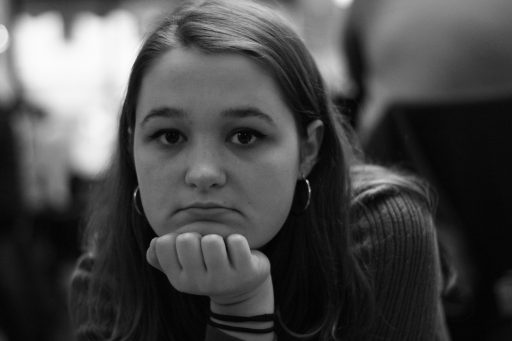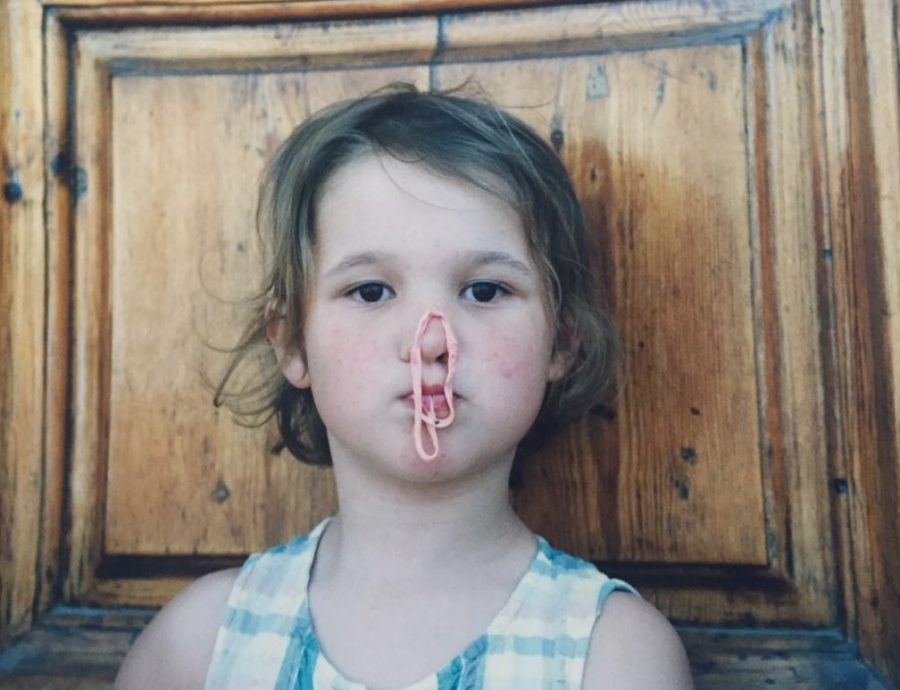About two months ago, on one of those perfect days that alluded to the upcoming Berlin summer, I was craving falafel. I stopped at one of the many Dönerbuden that line the streets of this city (near Eberswalder Straße, if anyone’s curious) to give into my cravings. After encountering the chirpy vendor and ordering my food, I found myself wrapped up in a conversation that mirrored one I had had many times before:
“Aren’t you supposed to be in school?” the vendor asked, his voice layered with mild condescension.
None of your business, I thought, but smiled artificially and explained that I was no longer in school but had moved on to university, leaving out that my high school graduation had taken place three years before. It was better for him to think that I just turned 18. He looked genuinely baffled and exclaimed that he was certain I had to be around 14 or 15 years old. After amusedly asking me a few questions about what I was studying, he reiterated that he had been certain that I was much younger than I claimed to be. He took his time making my order, all the while informing me of his observations of me, teasing me intermittently, and laughing at my flushed face and assurances that I was in fact not 15. Half expecting the vendor to tell me I look cute when I’m flustered, I shuffled out of the store, falafel in hand and cheeks pink with embarrassment.
The day before this happened, I was getting my hair cut by a woman in Kreuzberg who only spoke to me to ask how old I was and told me twice that she had judged me to be 16, 17 at most, when she saw me walk in. It has become a touchy subject for me, to say the least. Of course, I encounter this kind of back and forth when purchasing alcohol, too, but somehow I’m much happier to clarify my age or hand over my ID when I’m not being accused of being too young to purchase lunch in the middle of a school day or buy caffeinated Nespresso capsules (funny story: that happened, too).
It seems like this unique kind of small talk follows me around, as does the resulting insulted feeling. After years of dramatically convincing myself that the people behind these comments must be out to get me, I’ve decided to unpack these conversations into the motivations and actions that underpin them to understand the offended feeling in my gut better.
First of all, I doubt anyone is actively out to get me. Some people genuinely think they’re complimenting me, I’m sure, because a youthful appearance is a socially desirable quality, especially for women. It’s even considered taboo to ask about an older woman’s age, or any woman’s age for that matter. But since I look 15 or 16 and appear to be a child, the topic of my age is open for debate. In many Western societies, a woman is considered less sexually attractive and thus less worthy of attention and respect the more she ages. However, the same does not seem to be true for men: actors like George Clooney are considered to have even gotten handsomer with age, whereas this is almost never deemed to be true for female actors or women in general. To quote the late Carrie Fisher, whose appearance was the subject of Hollywood tabloids ever since she wore a metal bikini for Star Wars: Return of the Jedi: “Men don’t age better than women, they’re just allowed to age.”[*1] A woman is expected to be embarrassed of undergoing the very natural process of ageing. So, if you’re a polite person, you don’t openly allude to that and insult her by forcing her to reveal how old she is. The consequences of such judgements could range anywhere from low self-esteem to dangerous dieting in order to achieve a more youthful-looking body.
Why, then, if I seem to find myself at the more “positive” end of this age hierarchy, am I still so bothered to be mistaken for a 15-year old school girl? The answer lies at the intersection of ageism and sexism.
Both of these regulatory systems of values create hierarchies in society where young people (in the former) and women (in the latter) occupy the bottom tier. We are shaped by these systems, and they are embedded in our culture. They lead us to think less of the competence, experiences, emotions, and opinions of the affected, and lead to discrimination based on gender and age. Ageism, when used colloquially, usually refers to discrimination against older people, but it can also describe prejudice against young people in certain contexts, like professional spaces, where they ordinarily find themselves at the bottom of a hierarchy. Since I will be reflecting on my experiences as a baby-faced person, I will be using the term ageism to refer to prejudice and discrimination against younger or younger-looking people.
Something important to note here is that ageism is not exemplified in the assumption that a younger person can’t perform a task (because they are objectively less experienced), but rather in the assumption that, fundamentally, a younger person’s emotions, feelings, opinions, and overall worth is less than that of an older person. An example would be believing that love between adolescents is less meaningful than love between adults. So, when someone perceives me to be 15 years old and speaks to me with that assumption in mind, they’re not complimenting my youthful glow but instead giving themselves the freedom to address me with whatever tone they please, to joke about me and make patronizing comments in a way that they wouldn’t with someone they perceive to be a legitimate adult. I’m regarded as a teenager, a child, and if I feel disrespected, embarrassed, irritated, or offended, that is just pubescent drama.
The fact that I’m female only intensifies this attitude. Generally speaking, when it comes to boys or men, it seems like they are given a great deal of time to mature emotionally (and often take advantage of this) and cut slack in terms of performing certain tasks that are essential for functional adulthood (i.e. domestic/household work). At the same time, one of the products of sexism is that boys are pushed to act like men fairly early in their lives — for example, they are expected to have sexual desire and sex earlier than women. In turn, they are also treated more like adults precisely because of things like sexual readiness. Girls and women, on the other hand, are talked down to and often not taken seriously (especially when they look younger), but paradoxically sexualized and treated like women in that regard very early in their lives.
Ageism’s effects on women are not only confined to their desexualization or that they are seen as less beautiful or less worthy of love as they age. At the opposite end of the age spectrum, women are seen as unworthy of professional respect. Clearly, no one is winning here, and while I’m sure baby-faced men out there relate to my experiences as well, the particular problem I’m touching on here is that, when it comes to looking very young as a woman, the problem gains another dimension. While I can handle the annoyance that comes with daily small talk about a subject that has become touchy for me, I won’t tolerate being treated differently in a professional setting: I’m about to begin my first summer internship and am curious if my youthful appearance will affect the respect and seriousness I will be treated with. Workplace sexism is a real problem (according to the Eurostat, women’s hourly pre tax wages were found to be an average of 16.2% less than men’s in the EU in 2016 [*2]), and I’m sure ageism will add another dimension to it for me, as it does for many others.

Let me be clear: I don’t want to claim there is oppression where there is none. Like virtually all women, I, too, experience a degree of sexism. But, I acknowledge the privilege that my skin color and economic background award me. That being said, my genes, gender and thus my physical appearance (thanks for the chubby cheeks, dad!) come with a set of largely undiscussed difficulties and annoyances. For more insights into the baby face experience, I want to point you to “21 Problems Only People With Baby Faces Will Understand” by BuzzFeed. Number 18 is all too real to me: Many well-meaning friends and family members have reminded me how grateful I will be for my young face a few decades from now, but this isn’t as comforting as it’s intended to be. Twenty years from now, I don’t want my lack of wrinkles or some other arbitrary marker of youth to secure me more respect or appreciation. I also don’t want other women, who look their age now or will look older than they are as they age, to be looked down on and regarded as less beautiful for that. Ageism and sexism have a funny way of colliding: they ensure that a young woman who looks even younger has a hard time being taken seriously, while also shaming women as they grow older and lose their “appeal”.
I want to end with a few pieces of advice for my baby-faced friends and those encountering young-looking women in their personal lives and workplaces. In my experience, focusing on not taking comments about my age and appearance personally has been a more valuable use of time than trying to take these observations as compliments. It’s more likely that people take about half a second to size you up and don’t bother to apply a filter to what they say than that they take the time to think of how a comment affects you. At the end of the day, putting a considerable amount of distance between you and what people think of you is the best way to counter unrequested observations and opinions.
For all those who come across baby-faced humans: remember that the weather and late BVG trains are a perfectly acceptable options for small talk. It’s always better to exercise sensitivity towards systems in society that affect certain people and keep observations about the appearance of others to yourself unless asked for your opinion.
Notes:
[*1] Wang, Yanan. Carrie Fisher to haters: Youth and beauty are not accomplishments. The Washington Post. December 30, 2015. https://www.washingtonpost.com/news/morning-mix/wp/2015/12/30/carrie-fisher-strikes-back-at-haters-youthbeautyrnot-accomplishments/?utm_term=.4a257a77212f
[*2] European Commission. Gender Pay Gap Statistics. Report. Eurostat. http://ec.europa.eu/eurostat/statistics-explained/index.php/Gender_pay_gap_statistics

